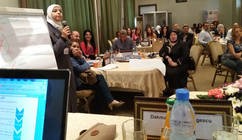At
the invitation of the Syrian National Centre for Curriculum Development (NCCD)
and the Syrian NATCOM, UNESCO Office in Beirut conducted on 10-12 May 2017 a
training workshop in Damascus on quality textbook development and
implementation. More than 35 Syrian curriculum and textbooks specialists
participated in the training with a view to upgrade their skills in designing
and implementing quality textbooks for primary and secondary education.
While facing hardships engendered by
the protracted Syria crisis, such as the lack of modernized textbook production
units, NCCD is yet determined to introduce revised textbooks in schools
starting with September 2017. The new textbooks should mainly reflect the NCCD
learner-centred approach by promoting interactive teaching and learning, based
on relevant content and classroom interaction.
During the training, the role of
textbooks in facilitating quality learning has been tackled, especially with a
view to exploring new developments of learning resources in the digital era.
NCCD shared also some preliminary results of pilot testing the new textbooks in
Syrian schools. Different working groups (i.e. Arabic and other languages;
Math; Sciences; Social Studies; The Arts; Health and Sports) shared samples of
their new textbooks for different grades. The constructive critique of their
peers, as well as of the workshop leardership and resource persons, helped the
participants agree on a framework for assessing the quality of textbooks
against promising practices in Syria, the wider Arab Region and
internationally. Such a textbook guide (or quality framework) includes features
about the learning philosophy and approach(es); content selection and
organization; structural issues (i.e. of the textbook as a whole and of
internal chapters/learning units); and the learning and teaching methodologies,
including student activities and assessment elements. The textbook quality
guide looks also into issues of layout and user-friendliness, while considering
equally cost-effectiveness and other important textbook distribution aspects.
By the end of the workshop,
participants agreed on some main quality features that all subject areas should
take into account in a harmonized way. They have also identified additional
needs for capacity development, especially with regard to the areas of editing,
layout and printing. The issue of reinvigorating internal and external quality
control has been also brought up, through building on past experiences when
Syrian textbooks were considered examples of best practices in the Arab Region.
As one of the participants stated,
“the Syrian curriculum and textbook specialists are now facing the challenge –
and the paradox – of using traditional learning tools, such as textbooks, to
instill new learner-centred learning and teaching philosophies and practices.
Such challenges are ever more so overwhelming when thinking of the important
roles textbooks should also play with regard to securing friendly environments
and psychosocial support for both students and teachers.”
As part of its ongoing assistance to
Syria, UNESCO Office in Beirut will further collaborate with NCCD in providing
meaningful follow up capacity development activities for its staff, especially
with regard to preparing the successful gradual implementation of new textbooks
starting with the school year 2017-2018.


